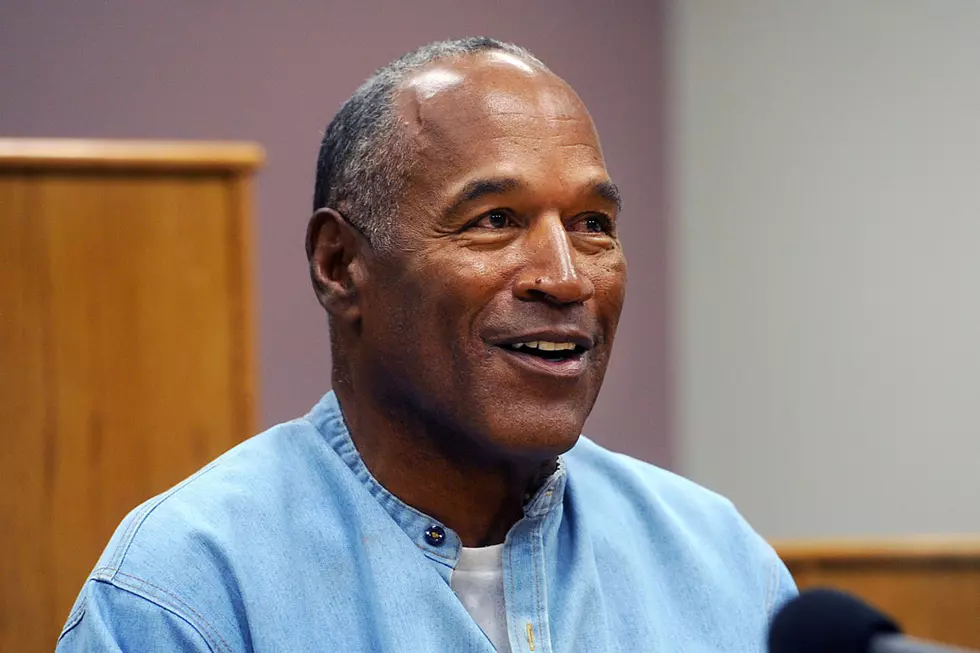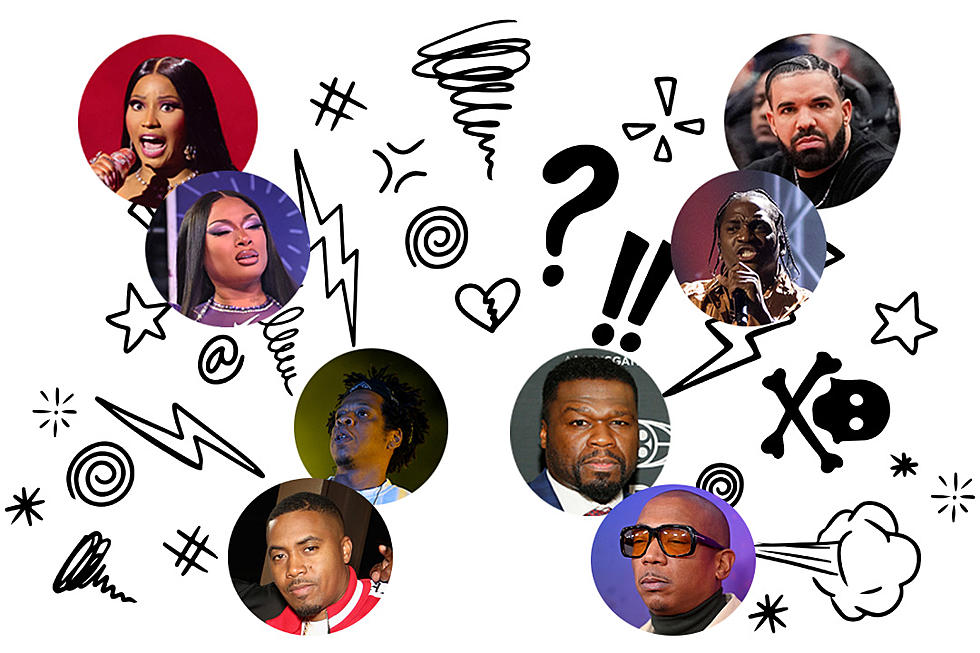![Veteran’s Day [Full Story from the October 2011 Issue]](http://townsquare.media/site/812/files/2011/09/raekwon-image1.jpg?w=980&q=75)
Veteran’s Day [Full Story from the October 2011 Issue]
No one even pretends to do a double take over Jay-Z's longevity anymore. Remember, during his "un-retirement" period, circa Kingdom Come, when there was question about whether he could still bring it? Those questions don’t get asked so much these days. Jay is pushing 42, and this summer he’s got a brand-new throne for us to admire. His collaborator, Kanye West, who just turned 34, makes it hard not to conceive how he could still be relevant, if not dominant, half a decade from now.
For a form that used to chew up its legendary innovators with an astonishing quickness (Rakim, what happened?), this is a noteworthy, and relatively recent, development. “Well, you’ve cherry-picked the genre’s top star as an example,” one could object. But it isn’t just Jay who has blasted past the most imposing barrier to middle-age success. More and more, we’re seeing veteran artists extend their commercial viability in what has long been known as a young man’s game. The conventionally accepted life span of a rapper is changing. As 40-year-old rappers become the norm, the question becomes, when will they stop? And why would they? Hell, the way things are looking, Dre might be 50 years old by the time Detox finally drops. Call it Energizer Bunny hip-hop. They keep going and going.
What has brought about the change? And what are the secrets to aging gracefully in rap? As different as every long-term career in rap tends to be, there are some broad similarities. The fan base that supports an MC’s first act usually is not sufficient enough—or doesn’t stay cohesive enough—to sustain a decades-long career. For rappers with that ambition, this reality requires constantly finding new allies, as well as going out and discovering pockets of affection the rapper didn’t even know existed in the first place.
It was only through his recent touring with Kansas’s Tech N9ne, who turns 40 in November, that Bay Area mainstay E-40 found out about a new strain of hardcore fan. “You’ve heard of the Juggalos?” says 40, 43 years old himself, of the crazed cultish devotees of Detroit’s Insane Clown Posse. “Not everybody know that, but Tech got an established fan base. I did a 43-date tour with Strange Music. And it was quite interesting, because I went to places that I didn’t think was fuckin’ with me yet. Everywhere—all down the East Coast, Midwest, South—we hit every angle… There’s a lot of Juggalos out there. They be fired up. What’s that, ‘mosh pit’? They be doing that in the crowd. And I just tripped on that. The response: They knew my hood shit; they knew everything. You’d be surprised.”
After a full decade in decline, the 43-year-old Raekwon has been experiencing a powerful resurgence since his widely acclaimed 2009 comeback, Only Built 4 Cuban Linx…Pt. II. It’s a resurgence that has come with a certain shift in demographics, too, as Rae and his Wu-Tang compatriots have become favorites of the indie-rock fans who center around pitchfork.com and have taken—as has been a trend in various musical genres of late—to performing some of their classic 1990s albums in their entirety. But Rae got a whole new perspective on the reach of his legacy this past spring, when Illinois Republican State Senator Christine Radogno rose during a floor debate…to cite a banger from one of those albums.
“Some of you may know that, last night, Raekwon from the Wu-Tang Clan was in town,” Radogno said, throwing a long, Midwestern twang into the last syllable of the Chef’s moniker. “And I got some financial advice from him, which I would like to share with all of you, because it does seem quite relevant.”
Radogno proceeded to bite a portion of the script from the classic Chappelle’s Show sketch “Wu-Tang Financials,” in which Raekwon made a guest appearance touting a financial-advisory business based on the lessons put forward in the group’s 1993 hit “C.R.E.A.M.”
“The most precious thing in the world is the financial security and well-being of your family,” Radogno said, quoting Rae. “You want to send your little ones to the best school, and in the end, you want to know you’ve left them with peace of mind. Nowadays we all know that cash rules everything around us: C.R.E.A.M. Get the money. Dollar, dollar bill, y’all. Thank you.”
“I heard about it,” Raekwon says, still sounding amazed. “This is something that wasn’t premeditated for me. It was just love. At first my peoples told me about it. I was like, ‘What they tryin’ to do, label me on some Fidel Castro shit or something? What’s going on?’ But then, as I took a look at it, it wasn’t nothing disrespectful, you know what I mean? And honestly, when I tell you I was shocked, I was only shocked at the people she was saying it to. All you see in there was suits and books, you know?
“Maybe she came to the show that night and was coolin’ with her girlfriend or whoever, and they was like, ‘Wow, this is an intelligent kid.’… I think I’m a smart dude. I think I have enough common sense to show another side of me, and maybe she seen that.”
FOR MORE VETERAN'S DAY, GO TO PAGE 2
Another thing that has contributed to the lengthening of many artists’ careers is the European tour circuit. (This is even more important, of course, at a time when revenues from record sales have been drying up.) “One thing that I learned about hip-hop, when I went overseas,” says Tech N9ne, “I saw Run-DMC, Slick Rick and EPMD selling out concerts. They still getting money. That was beautiful.” At his own shows—at one in Canada, for example—he saw parents holding up an excited four-year-old who sported venue-appropriate earplugs and a Tech N9ne shirt. “I was like, They gonna be Tech N9ne fans forever,” Tech says. “People been speaking about Tech N9ne for years—back when they were saying, ‘Aw, that’s that devil-worship shit,’ you know what I mean?… So now all the people [who] didn’t know can go listen and catch up.”
Raekwon says the same, and he credits continental audiences for developing educated hip-hop tastes that keep the latest trends in perspective. “Definitely, the old U.K. is always exciting for me,” he says. “I always said, back in the day, that the U.K. appreciates real hip-hop and true artistry more than we do. They don’t look at you like, ‘Yo, you yesterday’s artist.’ They look at you like, ‘Yo, we got some younger guys that we put on, and they know about you already.’ Then you become this leader.”
Tech N9ne recalls how, years ago, when he would first tour towns overseas, a bad night might net only seven ticket buyers. (He stresses that, even when that was the case, he always gave each and every show 100 percent.) Today? “Hip-hop is everywhere, man. I swear.”
There are realities to face with growing older in rap, of course. Going from the hot burn of early stardom to a more temperate but often longer-lasting, midrange level means artists need to develop new attitudes and strategies to match their changing demographics. Radio play, for example, tends to diminish. If you’ve gotten used to hearing your voice coming out of the speakers at Foot Locker every time you go to the mall, it can be hard to deal with when that stops. It’s something to accept.
“If I’m not on the radio today,” Raekwon says, “hey, I have proved that I have been there and conquered that atmosphere already.” But he makes it clear that he’s conscious of how such a quote might sound to an outside observer: the rationalization of an old-timer. “I’m not saying that radio hasn’t been good for me. But it’s not always about being on the radio.”
In the decade between 1999’s Immobilarity and Only Built 4 Cuban Linx... Pt. II, Rae says he thrived on being counted out. “I want people to not like me. I want people to not all the way believe me. Because if it wasn’t for that, I would be the most cockiest bitch you probably ever seen in your life. And that’s not me. I’m used to the turbulence. I’m used to being underwater and not being accepted… I think having these certain blessings behind me keeps me moving forward.”
Maybe you think that’s just a justification made for public consumption—and that any artist would prefer to stay on the airwaves forever, if only they had sufficient corporate support to make it happen. But you’ll hear a different tale from E-40, who spent a healthy chunk of the past decade doing pretty well for himself on airwaves, alongside Lil Jon, during crunk’s heyday, with promotional backing from the Warner/Reprise behemoth.
Today, 40 professes himself honestly happier on his own, working on a smaller scale, with his Revenue Retrievin’ series, for instance, which he puts out on his own label, Heavy on the Grind Entertainment, with distribution through EMI. (Regardless of the economic scale, he certainly sounds invigorated creatively. This year’s Graveyard Shift album, in particular, is as focused an artistic statement as he’s ever made. And he’s fully embracing his age and his status with his plans to make a joint album with fellow Bay Area graybeard Too $hort, forthrightly titled The History Channel.) Speaking about his former major label, he notes with some pride that “there ain’t been a rap album they’ve dropped” since his 2006 My Ghetto Report Card that has done as well for them.
Despite this, he can still remember how a clutch of his hardcore fans didn’t like the direction those sales inspired him to take directly afterward. “A lot of it had to do with Warner, and a lot had to do with Lil Jon and his team, as well as me having a fan base that was gonna go snatch at least 200,000 albums, regardless of what kind of song I had out,” he remembers. “And we went in, man. But the next album, [Warner Bros.] was seeking for another single, so I did something different: a song with my man Akon [‘Wake It Up’]. It was a song that was like a Top 40 song. And it coulda gone farther if my fan base accepted it.”
He pauses, a rarity for the quick-tongued smooth talker. “Some accepted it, but—I’m keeping it 1,000 with you, I’m keeping it really real with you—that’s not the kind of song that my fan base wanted me to be doing. I understand, because they come up off of Mr. Flamboyant, shit like that.”
It’s a difficult thing, finding that balance between expanding your audience and consolidating the affections of the early admirers who won’t desert you at the first sign of trouble. So it’s not a huge surprise that it’s taken decades for hip-hop to establish the global infrastructure that makes this possible. But those MCs who’ve hustled their way into a third, or even fourth, decade of rapping know that this is not only a blessing but a constant source of surprise. Busta Rhymes, Ghostface Killah, De La Soul, Method Man, Redman and ?uestlove are all over 40 years old and still relevant, while Black Thought, Snoop Dogg, Common and Eminem are just one or two years away from the big 4-0. Whether it’s a state senator reading lyrics into the official record or a rapper discovering an enthusiastic clutch of lyrics-reciting fans in a mosh pit he barely knows how to describe, the rapper succeeding after the age of 40 takes his ease, and a measure of comfort, from the realization that he doesn’t have to sell out his game to survive. And damn if that reality doesn’t feel like its own kind of throne.
**PICK UP THE OCTOBER 2011 ISSUE OF XXL, ON STANDS NOW**
More From XXL









